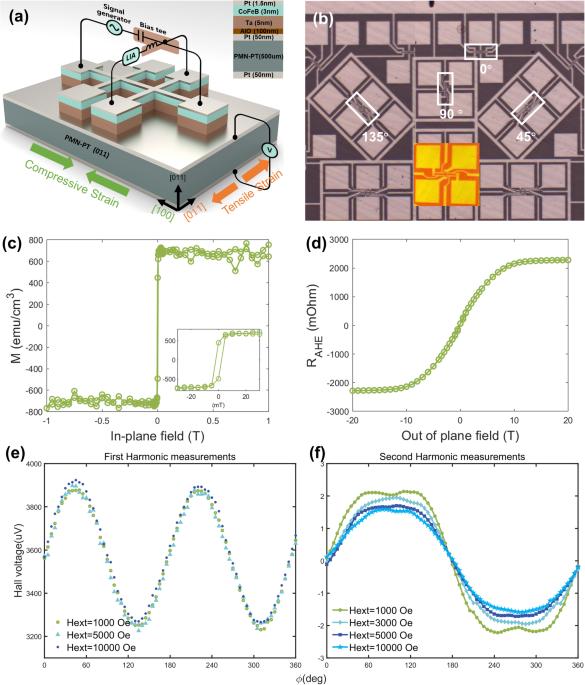An energy efficient way for quantitative magnetization switching
引用次数: 0
Abstract
Recent advancements in electrically controlled spin devices have been made possible through the use of multiferroic systems comprising ferroelectric (FE) and ferromagnetic (FM) materials. This progress provides a promising avenue for developing energy-efficient devices that allow for electrically controlled magnetization switching. In this study, we fabricated spin orbit torque (SOT) devices using multiferroic composites and examined the angular dependence of SOT effects on localized in-plane strain induced by an out-of-plane electric field applied to the piezoelectric substrate. The induced strain precisely modulates magnetization switching via the SOT effect in multiferroic heterostructures, which also exhibit remarkable capability to modulate strain along different orientations – a feature with great potential for future applications in logic device arrays. To investigate the influence of electric fields on magnetization switching, harmonic Hall measurements, synchrotron-powered x-ray magnetic circular dichroism-photoemission electron microscopy (XMCD-PEEM), x-ray diffraction (XRD), magnetic force microscopy (MFM), and micromagnetic simulation were conducted. The results demonstrate that electric-field-induced strain enables precise control of SOT-induced magnetization switching with significantly reduced energy consumption, making it highly suitable for next-generation spin logic devices.

定量磁化切换的节能方法
通过使用由铁电(FE)和铁磁(FM)材料组成的多铁性系统,电控自旋设备取得了最新进展。这一进展为开发可实现电控磁化切换的高能效器件提供了一条大有可为的途径。在这项研究中,我们利用多铁性复合材料制造了自旋轨道转矩(SOT)器件,并研究了自旋轨道转矩效应对施加到压电基板上的面外电场诱导的局部面内应变的角度依赖性。诱导应变通过多铁氧体异质结构中的 SOT 效应精确调节磁化开关,这种异质结构还具有沿不同方向调节应变的显著能力--这一特性在逻辑器件阵列中的未来应用中具有巨大潜力。为了研究电场对磁化切换的影响,研究人员进行了谐波霍尔测量、同步加速器驱动的 X 射线磁性圆二色性-光电发射电子显微镜 (XMCD-PEEM)、X 射线衍射 (XRD)、磁力显微镜 (MFM) 和微磁模拟。结果表明,电场诱导应变能够精确控制 SOT 诱导的磁化开关,并显著降低能耗,因此非常适合用于下一代自旋逻辑器件。
本文章由计算机程序翻译,如有差异,请以英文原文为准。
求助全文
约1分钟内获得全文
求助全文

 求助内容:
求助内容: 应助结果提醒方式:
应助结果提醒方式:


